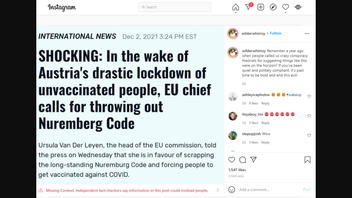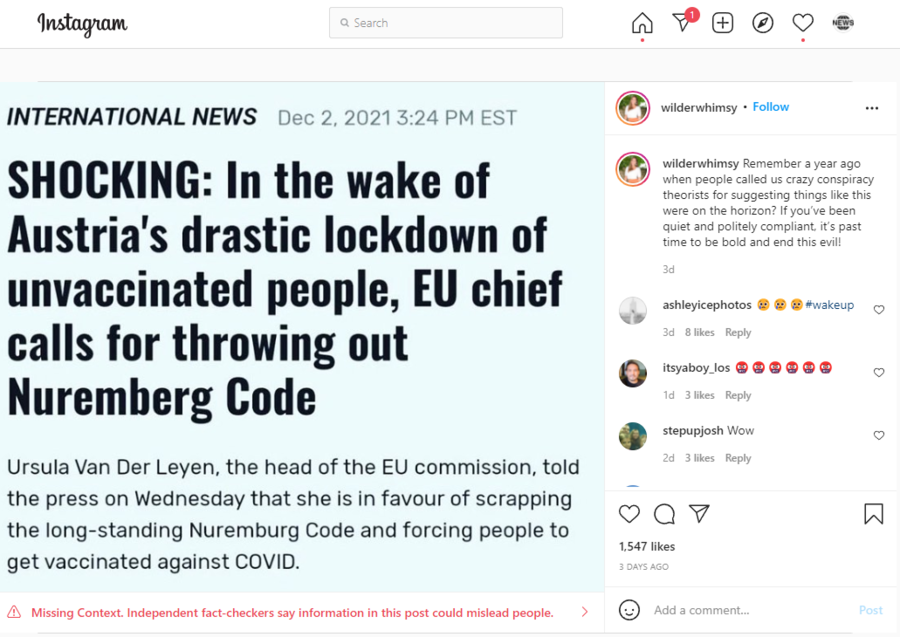
Did the head of the EU Commission call for throwing out the Nuremberg Code? No, that's not true: Ursula von der Leyen, the president of the European Commission (EC), said at a December 1, 2021, news conference that it is time to consider mandatory COVID vaccinations, but made no mention of the Nuremberg Code, which is a collection of ethics guidelines for human experimentation, but has never been adopted as law by any nation.
The claim appeared in an image in an Instagram post (archived here) on December 4, 2021. It opens:
SHOCKING: In the wake of Austria's drastic lockdown of unvaccinated people, EU chief calls for throwing out Nuremberg Code
Ursula Van Der Leyen, the head of the EU commission, told the press on Wednesday that she is in favour of scrapping the long-standing Nuremburg Code and forcing people to get vaccinated against COVID.
This is what the post looked like on Instagram on December 7, 2021:
(Source: Instagram screenshot taken on Tue Dec 7 18:59:24 2021 UTC)
The Instagram post includes a pair of spelling errors. First, von der Leyen's name is misspelled "Van Der Leyen." Secondly, Nuremberg is misspelled "Nuremburg" after initially being spelled correctly.
There's no evidence of von der Leyen talking about the Nuremberg Code in the December 1, 2021, news conference and reporters never asked her about it. The nearly 28-minute event can be watched on the European Commission website. The EC president did say it was "understandable and appropriate" for EU members to discuss mandatory COVID-19 vaccinations:
How we can encourage and potentially think about mandatory vaccination within the European Union? This needs discussion. This needs a common approach, but it is a discussion that I think has to be led.
The Nuremberg Code was developed more than 70 years ago in response to medical experiments conducted on prisoners by Nazi doctors during the Holocaust and World War II. Vaccines are not mentioned anywhere in the code. Lead Stories previously debunked a claim that mandatory vaccinations are in direct violation of the Nuremberg Code. While it clearly addresses the ethics around human experimentation, it does not deal with approved vaccines or vaccine mandates, neither of which are considered experimental.
Many members of the anti-vaccine community consider the COVID vaccines to be experimental despite their receiving emergency use authorization. The Pfizer vaccine gained full Food and Drug Administration approval in August 2021.
Because it is not a law, the Nuremberg Code cannot be suspended. Still, the document has made a lasting impact. Its importance was spelled out in a November 13, 1997, New England Journal of Medicine article titled "Fifty Years Later: The Significance of the Nuremberg Code":
The Nuremberg Code has not been officially adopted in its entirety as law by any nation or as ethics by any major medical association. Nonetheless, its influence on global human-rights law and medical ethics has been profound. Its basic requirement of informed consent, for example, has been universally accepted and is articulated in international law in Article 7 of the United Nations International Covenant on Civil and Political Rights (1966).

















